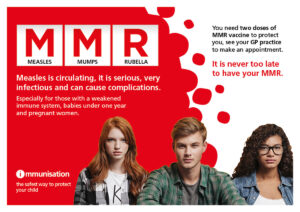
Measles is in the news again, with serious outbreaks in Wales and England and the number of children catching measles is rising.
Measles can be a very serious disease, leading to ear and chest infections, fits, diarrhoea, and damage to the brain; measles can kill.
Your child is at risk of measles if he or she hasn’t had the MMR vaccination; two doses of MMR vaccine are needed to get the best protection.
If your child is due to have had two doses of MMR but has not yet received them, no matter what age they are, you should contact your GP to get them vaccinated as soon as possible.
If you can’t remember if your child has had any, one or two doses of MMR vaccine, check his or her personal child health record (the Red Book). If this doesn’t help, speak to your GP.
